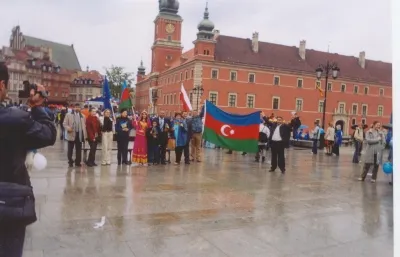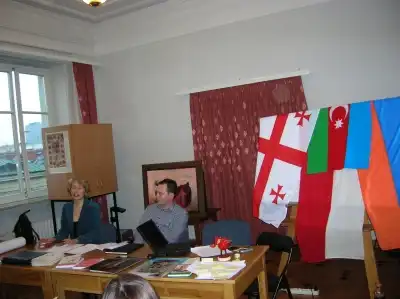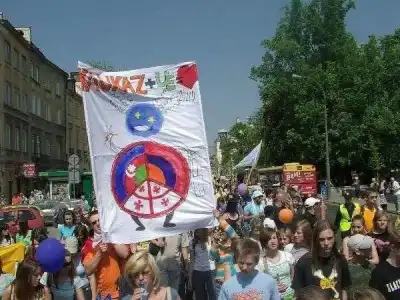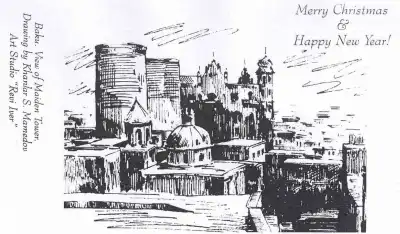When asked by an Azeri: 'Where do you come from?', I answer: 'From Baku.' In Georgia or Armenia, I say I am an Azerbaijani citizen. When I am asked in the European countries where I am from, I answer shortly: 'I am from the Caucasus'. However, when answering the same question in China or Uzbekistan I say I am a European. And my name is Aliyewa, Hidżran Aliyewa. I remember when I was very small, and altogether with my father, before going to sleep, we listened to the music of different composers. I was probably four when for the first time I heard the Polonaise of Ogiński. My father described me in very simple words the history of Poland. He told me about the partitions of the Grand Duchy of Lithuania, about the country devastated by the war, about soldiers and the bitterness of defeat, about people believing in victory and freedom until the very last moment. I did not know where that country was. I thought it was a beautiful fairy tale from my books which I did not know read. That night came a turning point.
It was the first encounter with Poland from that day over 20 years ago. I worked as a journalist in the national television and I prepared a program about Poland. So from that time on, I grew attached to that country, particularly to Warsaw. I love her! Almost the same as Baku.
28th May, 1918 is a very important date in the history of Azerbaijan. It was a beautiful spring day when the dream of the Azeri intelligentsia came true, when the Democratic Republic of Azerbaijan was proclaimed. The name of M. A. Resulzade is closely linked to this event. Unfortunately, the fate was severe to the young Republic. In 1920, the country was occupied by the Bolshevik and soon Azerbaijan joined USRR. The Azeri activists could not stand the defeat that is why a part of them emigrated to Poland. The country warmly received all the political emigrants from the countries of the eastern Europe and the Caucasus. Right here in Warsaw, the fine and lofty idea of the creation of the Common House of the Caucasus emerged. The leaders of this organization were M. A. Resulzade, M. E. Mehdiyew, N. Jordania, A. Czkhenkeli, A. Asantnani, S. Mdiwani, M. Sunszew and I. Czumszew. Unfortunately, the Caucasian heroes did not manage to gain their objective fully.
Luckily, we have behind ourselves two World Wars, “Cold War,” and the disintegration of the Soviet Union. Nowadays, we come to Poland again: some of them study at the universities, others visit the capital at the invitation of their friends, and there are those who come to trade in the stadium Fair Europe in Warsaw.
At the beginning, I started to look for the Azeri at the stadium but there were the representatives of all the Caucasian nations that is why it is difficult to distinguish an Azeri from a Georgian, and a Chechen from an Armenian.
It was the time when I started to promote Azerbaijan in Warsaw so loudly that my countrymen found me on their own. I succeeded. In 2004, during the R.Schuman parade appeared several dozens of my countrymen who nowadays are in charge of the Azeri diaspora in Warsaw. Among them, there are the representatives of the Azeri intelligentsia: painters, architects, engineers, writers, businessmen and teachers. I like gossiping about them.
Ajdyn Łazimow who has been living in Warsaw for 17 years loves people’s faces and sweet pomegranates because he is a painter, an artist. He runs his own studio on Grochowska St. where we frequently have meetings, i.e. we drink tea or we taste Jaffa Cakes Information on his art is available on www.ajdyn.pl
Kerim Mamedow is a painter too. He is beloved by all our diaspora but he makes me nervous when he calls our group “kolkhoz.” Dżalal resides on Al. Jerozolimskie. He has Azeri and Persian rugs in all his rooms. Dżalal does not hide he likes Baku comfort and Warsaw fast lifestyle.
Narmina Hebanowska brings up Julek, and in her free time she carries out the project known under the name: “Childbirth with dignity” for the Azeri mothers. Lila xanym is Bakuvian but she has been living and teaching here for 20 years. Her husband, Jaszar has created a small museum of the Azeri culture at their home. Rowszan Rzajew runs an Ayer-Pol organization. He is a very occupied person but when he finds out that we are going to have a party related to Azerbaijan in Warsaw, he always finds a free time. The homeland is above all.
I can talk about the Azeri in Warsaw many hours. I still have not mentioned about Maliki and Tunzali, Szahli and Anara, Rufata and Nabi, Szakira and Enwera, Chingiza and Mubariza, Seyfela and Aziza, Hagani and Eldara... They are like a string of beads scattered throughout Warsaw. However being all together, they create a single and beautiful necklace.
In 2004, I found that quite a lot of Armenians and Georgians lived in Warsaw. I was curious how they managed. I also found that there were Georgian restaurants in Warsaw. „Tbilisi” (on the street Puławska 24) and „Suliko” (on the street Nowogrodzka 22), and there is also “Uczta ormiańska” (The Armenian feast) on the street Hoża 43/49.
I acquainted myself with an Armenian named Hakobem Baghdasaryanem who has a dancing group called Musa-Ler as well as the Centre of the Armenian Culture located in the street Marszałkowska 115.
Georgians actively work as well. Nowadays, it is possible to buy the best Georgian wines in some shops in Warsaw. However, the fact that for the last couple of years, there have been established a few foundations and associations on the promotion of the Caucasus culture makes me happy most. It is worth mentioning the Caucasian portal (www.kaukaz.pl), the chief editor of which is Krzysztof Dąbrowski. Information on the Caucasus is also available on www.kaukaz.net which is managed by the founders of the Caucasus Foundation.net.
It is possible to talk a lot about the Caucasus and their inhabitants, i.e. Chechens, Dargins, Ossetians, Abkhaz, Talishi, Lezgins, Udini and Oghuz… I recall a saying when God was settling the nations over the Earth. He took a single nation out of his pocket and he placed it kindly in an appropriate corner. When God got tired, he noticed that there was nearly no room left on the Earth and he still had a good many people in his pocket. He took the last handful of nations and he threw them upon the very hub of the universe. In this way, the Caucasus came into being. In fact, we know that the multiculturalism and multinationalism of the Caucasus are our asset. However, sometimes they are our problem, regrettably.
I like learning the history. I was looking for the information on the activity of the representatives of the Caucasus in Warsaw in the middle of 20th century. It was the time when I got acquainted with the idea of the Common House of the Caucasus. I thought it was worth renewing the tradition of our ancestors whose aim was to reconcile the nations of the Caucasus and to create a common space to mutually exclusive conflicts. To this end, the association known under the name: the House of the Caucasus in Poland was created in Warsaw. Our major watchwords are peace and agreement.
As a part of these noble undertakings, Poles help us to organize meetings and parties. Their aim is to restore the bonds between the nations of the Caucasus enmeshed in a feud after the disintegration of the USRR.
The First International Festival of the Caucasian Cultures, that is, the TRANSKAUKAZJA was organized in 2004 in Warsaw. Witek Hebanowski and Beata Szcześniak were the authors of this idea.
When the party was over, Witek Hebanowski, the president of the Other Space Foundation, shows his faithfullness to the Caucasus trying to organize regularly the TRANSKAUKAZJA – a Festival of the Caucasian Cultures which is unique in Europe. This year, the main concert will be organized on 23rd June, on Saturday, in the courtyard of the University of Warsaw. There will be a lot of music, dances, exhibitions and food. So, if you would like to see how a real Caucasus has some fun, it suffices to come on 23rd June at the party in Warsaw!
Text by Hidżran Aliyewa, June 2007.
Translated by Agnieszka Rabiega.












